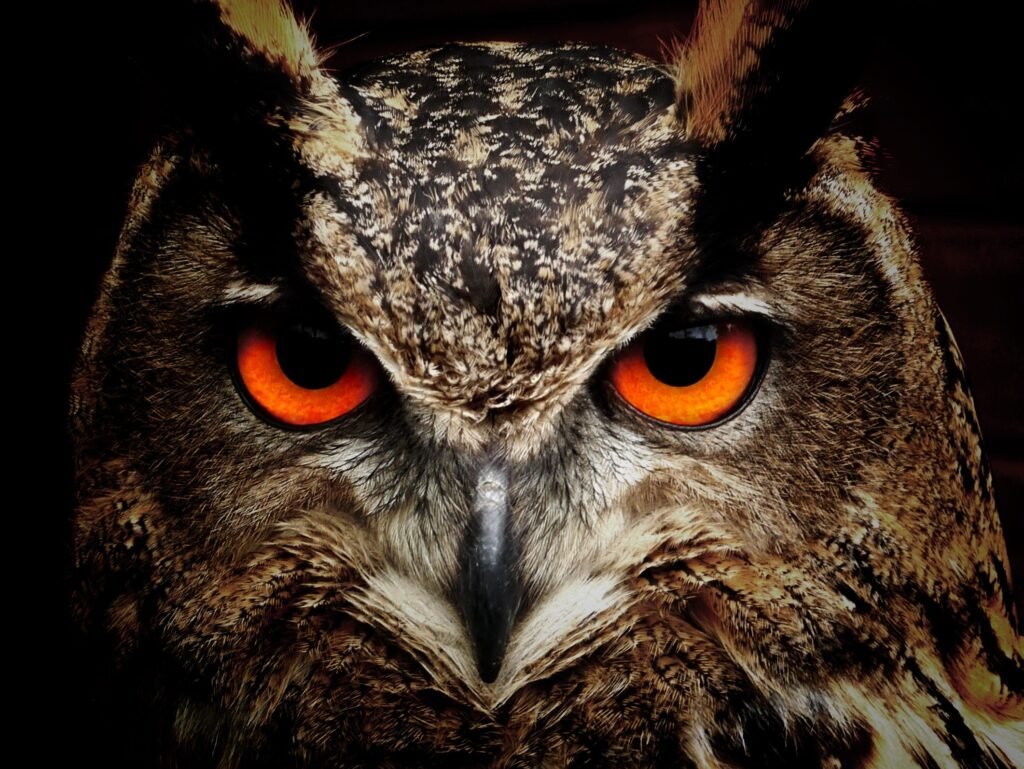Have you ever wondered what owl means in the Bible, or what the Bible has to say about owls? These nocturnal creatures hold a unique place in biblical symbolism, often representing both wisdom and desolation. While owls may seem like mysterious creatures of the night, their presence in the Bible offers valuable insights into their symbolic significance and how they relate to our spiritual journey.
Here on this article, we will discuss seven key aspects of owl symbolism in the Bible and what they can teach us about God and ourselves.
Owl Meaning in the Bible: 7 Things Scripture Says
Below are some of the key aspects of owl symbolism in the Bible and what they can teach us about God and ourselves.
1. Symbolizes Wisdom and Knowledge
Owls are often associated with wisdom and knowledge in many cultures and traditions. In the Bible, owls are also linked to understanding and discernment. For example, in Job 12:7-8, Job says, “But ask the animals, and they will teach you, or the birds in the sky, and they will tell you; or speak to the earth, and it will teach you, or let the fish in the sea inform you.” He then lists the owl among the creatures that have wisdom and knowledge of God’s works.
Similarly, in Proverbs 3:19, we read, “By wisdom the Lord laid the earth’s foundations, by understanding he set the heavens in place.” The word for “understanding” in Hebrew is “tebunah”, which is also the name of the owl in some translations. This suggests that the owl is a symbol of God’s wisdom and understanding in creating the world.
The owl can remind us of the importance of seeking God’s wisdom and knowledge in our lives. As Proverbs 2:6 says, “For the Lord gives wisdom; from his mouth come knowledge and understanding.” We can learn from the owl to be attentive and observant of God’s works and ways, and to ask Him for guidance and discernment in all situations.
2. Desolation and Ruin
Owls are also associated with destruction and desolation in the Bible. They are often mentioned in the context of abandoned cities and places that have been judged by God. For instance, in Isaiah 34:11, we read, “The desert owl and screech owl will possess it; the great owl and the raven will nest there. God will stretch out over Edom the measuring line of chaos and the plumb line of desolation.” This is a prophecy of God’s wrath against Edom, a nation that opposed Israel and God.
Similarly, in Jeremiah 50:39, we read, “Therefore desert creatures and hyenas will live there, and there the owl will dwell. It will never again be inhabited or lived in from generation to generation.” This is a prophecy of God’s judgment against Babylon, the empire that conquered and exiled Israel.
The owl can remind us of the consequences of sin and rebellion against God. As Romans 6:23 says, “For the wages of sin is death, but the gift of God is eternal life in Christ Jesus our Lord.” We can learn from the owl to repent and turn away from our wicked ways, and to trust in God’s mercy and grace through Jesus Christ.
3. They are used to depict Loneliness and Mourning
Owls are also linked to solitude and grief in the Bible. They are used to depict loneliness and sorrow in some passages. For example, in Psalm 102:6, the psalmist says, “I am like a desert owl, like an owl among the ruins.” He is expressing his anguish and isolation as he cries out to God for help.
Similarly, in Micah 1:8, the prophet says, “Because of this I will weep and wail; I will go about barefoot and naked. I will howl like a jackal and moan like an owl.” He is lamenting the coming destruction of Israel and Judah because of their sins.
The owl can remind us of the reality of suffering and sadness in this fallen world. As Ecclesiastes 7:2-3 says, “It is better to go to a house of mourning than to go to a house of feasting, for death is the destiny of everyone; the living should take this to heart. Frustration is better than laughter, because a sad face is good for the heart.” We can learn from the owl to be honest and humble about our emotions, and to seek God’s comfort and hope in times of trouble.
4. Symbolize Vigilance and Protection
Owls are also symbols of vigilance and protection in the Bible. They are among the unclean birds that are not to be eaten according to the law of Moses. In Leviticus 11:16-17 and Deuteronomy 14:15-17, we read, “The eagle, the vulture, the black vulture, the red kite, any kind of black kite, any kind of raven, the horned owl, the screech owl, the gull, any kind of hawk, the little owl, the great owl, the white owl.” These birds are considered detestable and abhorrent to God and His people.
The owl can remind us of the importance of being vigilant and protected from the evil and impurity of the world. As 1 Peter 5:8-9 says, “Be alert and of sober mind. Your enemy the devil prowls around like a roaring lion looking for someone to devour. Resist him, standing firm in the faith, because you know that the family of believers throughout the world is undergoing the same kind of sufferings.” We can learn from the owl to be watchful and wary of the schemes of the enemy, and to rely on God’s power and presence to shield us from harm.
5. Owls are Messengers of God’s Judgment
Owls are also messengers of God’s judgment in the Bible. They are mentioned in prophecies of destruction and calamity that will befall the wicked and the nations. For example, in Jeremiah 10:21-22, we read, “The shepherds are senseless and do not inquire of the Lord; so they do not prosper and all their flock is scattered. Listen! The report is coming— a great commotion from the land of the north! It will make the towns of Judah desolate, a haunt of jackals.” The word for “jackals” in Hebrew is “tannim”, which can also mean “owls” or “dragons”. This is a prophecy of God’s wrath against the false leaders of Israel and the invasion of the Babylonians.
Similarly, in Isaiah 13:21-22, we read, “But desert creatures will lie there, jackals will fill her houses; there the owls will dwell, and there the wild goats will leap about. Hyenas will inhabit her strongholds, jackals her luxurious palaces. Her time is at hand, and her days will not be prolonged.” This is a prophecy of God’s judgment against Babylon and its eventual downfall.
The owl can remind us of the sovereignty and justice of God. As Psalm 96:13 says, “Let all creation rejoice before the Lord, for he comes, he comes to judge the earth. He will judge the world in righteousness and the peoples in his faithfulness.” We can learn from the owl to fear and respect God as the righteous judge of all, and to obey and worship Him as the gracious king of all.
6. Spiritual Discernment and Insight
Owls are also connected to spiritual discernment and insight in the Bible. They are associated with keen observation and the ability to see beyond the physical realm. For example, in Job 39:29-30, we read, “From there it looks for food; its eyes detect it from afar. Its young ones feast on blood, and where the slain are, there it is.” The word for “it” in Hebrew is “lilith”, which is also the name of the owl or the night creature in some translations. This suggests that the owl is a symbol of God’s omniscience and omnipresence, as well as His provision and care for His creatures.
Similarly, in Isaiah 40:28, we read, “Do you not know? Have you not heard? The Lord is the everlasting God, the Creator of the ends of the earth. He will not grow tired or weary, and his understanding no one can fathom.” The word for “understanding” in Hebrew is “tebunah”, which is also the name of the owl in some translations. This suggests that the owl is a symbol of God’s wisdom and insight, as well as His power and endurance.
The owl can remind us of the need for spiritual discernment and insight in our lives. As Hebrews 4:12 says, “For the word of God is alive and active. Sharper than any double-edged sword, it penetrates even to dividing soul and spirit, joints and marrow; it judges the thoughts and attitudes of the heart.” We can learn from the owl to be attentive and receptive to God’s word and spirit, and to seek His perspective and direction in all matters.
7. Owls are Representatives of the Night and Its Mysteries
Owls are also representatives of the night and its mysteries in the Bible. They are mentioned in the context of darkness and the unknown. For example, in Psalm 139:11-12, we read, “If I say, “Surely the darkness will hide me and the light become night around me,” even the darkness will not be dark to you; the night will shine like the day, for darkness is as light to you.” The word for “night” in Hebrew is “layil”, which is also the name of the owl or the night creature in some translations. This suggests that the owl is a symbol of God’s presence and illumination, even in the darkest and most mysterious times.
Similarly, in Proverbs 30:26, we read, “hyraxes are creatures of little power, yet they make their home in the crags.” The word for “hyraxes” in Hebrew is “shaphan”, which can also mean “owl” or “coney” in some translations. This suggests that the owl is a symbol of God’s grace and provision, even for the weak and lowly creatures.
The owl can remind us of the mystery and wonder of God and His ways. As Romans 11:33 says, “Oh, the depth of the riches of the wisdom and knowledge of God! How unsearchable his judgments, and his paths beyond tracing out!” We can learn from the owl to be humble and awe-struck by God’s greatness and majesty, and to trust Him in the midst of uncertainty and darkness.
My Final Conclusion Words
Owls are fascinating creatures that have a rich and varied symbolism in the Bible. They can teach us many things about God and ourselves, such as wisdom and knowledge, desolation and ruin, loneliness and mourning, vigilance and protection, judgment and justice, discernment and insight, and night and mystery. By exploring the depths of biblical symbolism, we can enrich our understanding of God’s character and our own relationship with Him.
We hope you enjoyed this blog post and learned something new about owl meaning in the Bible. If you want to learn more about biblical symbolism and how it can enhance your faith, we invite you to check out our other blog posts and resources. Thank you for reading and God bless you!

